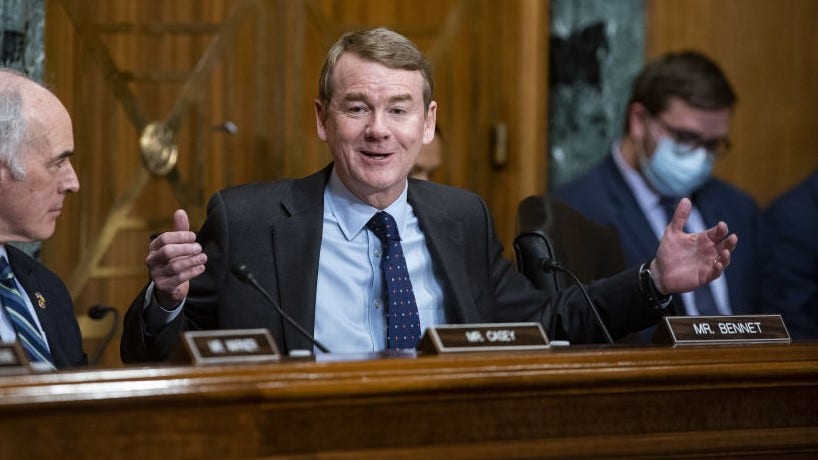In a recent appearance on NBC’s “Meet the Press,” Senator Michael Bennet of Colorado expressed deep concerns regarding the Democratic Party’s branding and connection with working-class Americans. Bennet’s remarks align with those of California Governor Gavin Newsom, who labeled the party’s image as “toxic.” The senator emphasized the necessity for Democrats to develop a truly compelling vision to reconnect with voters following their disappointing performances in recent elections.
| Article Subheadings |
|---|
| 1) Bennet’s Critique of the Democratic Brand |
| 2) The Call for a Compelling Vision |
| 3) Infighting in the Democratic Party |
| 4) The Importance of Bold Policy Proposals |
| 5) Looking Towards the Future |
Bennet’s Critique of the Democratic Brand
During his appearance, Senator Michael Bennet addressed the Democratic Party’s ongoing struggle to resonate with working-class citizens. He described the party’s brand as “really problematic,” hinting at its association with elite coastal regions, particularly New York and California, which he believes alienates many potential supporters. Bennet stated, “I agree that the Democratic Party brand is really problematic… it’s a brand that’s associated with New York and California, is associated with the educated elite in this country and not anymore with the working people in this country.” This sentiment reflects a notable concern within the party about its accessibility and connectiveness with broader demographics who feel disenfranchised.
The Call for a Compelling Vision
Building on his critique, Bennet echoed sentiments shared by Governor Gavin Newsom, who recently suggested that the Democratic Party’s image has grown “toxic.” Bennet emphasizes the urgency of establishing a “compelling vision” that can unify and inspire a diverse range of voters. He contextualized this need against the backdrop of past electoral struggles, particularly highlighting the party’s failure to adequately address the concerns of individuals affected by fifty years of trickle-down economics. “Most Americans feel like, no matter how hard they work, their kids aren’t going to live a life better than the life they led,” he noted, pointing to a widespread sense of stagnation and hopelessness that the party must address.
Infighting in the Democratic Party
Bennet’s remarks come at a time when the Democratic Party is experiencing significant internal discord regarding its future direction. Tensions have escalated within the party, particularly aimed at Senate Minority Leader Chuck Schumer, who has faced criticism for voting alongside Republicans on critical legislation intended to prevent a government shutdown. This has led to calls from some factions within the party for Schumer to resign from his leadership role. In this politically charged environment, Bennet refrained from reaffirming his trust in Schumer, showcasing the uncertainty and divisions that many party members feel regarding their leadership.
The Importance of Bold Policy Proposals
Senator Bennet further articulated the need for Democrats to step back and reevaluate their relationship with voters. He stressed that the party has been “repudiated at the national level” and, as such, must engage in a more introspective process to rediscover its core mission and values. According to Bennet, the party’s strategy should center on the development of bold policy agendas that address the real-world issues faced by everyday Americans. He argued, “If the Democratic Party would show up with some imagination, not only would we do better, but the American people would do better.” This call to action underlines a need for substantial innovation and creativity within the party’s approach to governance and outreach.
Looking Towards the Future
As the Democratic Party navigates these challenging waters, the future remains uncertain. The narrative crafted by Bennet and other party members highlights systemic issues that have led to disconnects with voters. The need to redefine the party’s identity and policies is both urgent and essential if Democrats wish to regain the trust and support of the electorate. With the next election cycle on the horizon, how Democrats address these internal critiques and reframe their messaging will likely play a pivotal role in their future successes or failures.
| No. | Key Points |
|---|---|
| 1 | Senator Bennet critiques the Democratic Party’s brand as disconnected from working-class Americans. |
| 2 | Calls for a compelling vision to reconnect with voters, citing the negative influence of elite associations. |
| 3 | Internal party tensions spotlight leadership challenges, particularly around Schumer’s decisions. |
| 4 | Emphasizes the need for innovative policy agendas to regain voter trust. |
| 5 | The importance of addressing systemic issues for future electoral success. |
Summary
Senator Michael Bennet‘s candid evaluation of the Democratic Party’s standing reveals critical challenges and opportunities for renewal. His push for a stronger connection with working-class Americans, coupled with calls for innovative policy development, underscores a broader need for the party to reestablish its identity in a rapidly changing political landscape. As internal conflicts continue to pose hurdles, how effectively the Democratic Party can adapt to these critiques could significantly influence its trajectory in upcoming elections.
Frequently Asked Questions
Question: What are the main criticisms voiced by Senator Bennet regarding the Democratic Party?
Senator Bennet criticizes the Democratic Party’s branding as elitist and disconnected from working-class Americans, urging for a more relatable and compelling vision.
Question: How does Bennet suggest the Democratic Party can reconnect with voters?
Bennet suggests that the party must develop innovative and bold policy proposals that address the real concerns of everyday Americans to truly regain their trust.
Question: What role does internal party conflict play in the Democratic Party’s current challenges?
Internal conflict, particularly regarding leadership decisions, has exposed fissures within the party and contributed to a perception of instability, complicating efforts to unify around a shared vision.


